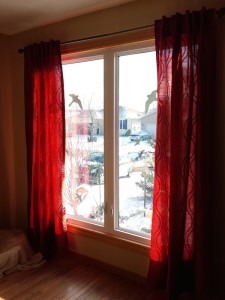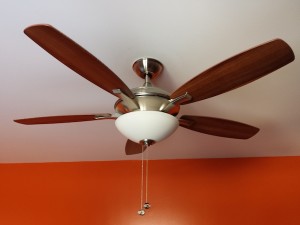Saving money on your heating bills can be very satisfying during the cold winter months. Depending on your home, there are several things that you can do to alleviate some of those utility blues.
Here are 10 of the easiest ways to save money this winter. With no investment, and no money out of hand, you can save big with just a few adjustments to your daily routines and habits.
 1. Turn your thermostat down one or two degrees.
1. Turn your thermostat down one or two degrees.
I know this sounds crazy to some people. Turn down my heat during the winter? I’ll freeze! Don’t worry. A couple of degrees will be noticeably cooler, but lucky for you they have recently invented these things called sweaters, slippers, and blankets. What perfect timing for you! But seriously, over the course of a year you could save 2% for every degree you turn your thermostat down. And don’t forget, we can get used to cooler temperatures.
2. Don’t heat areas that aren’t insulated.
Attics, crawlspaces, storage sheds and garages. Unless you have water lines in those areas, they don’t need to be heated. And if the space isn’t insulated then you just throwing your money away!
3. Avoid heating rooms that aren’t used on a daily basis.
Most people have a room or two in their house that is barely used. It could be an office, spare bedroom or even a rec room. If you aren’t using it, close the door and the vents. Why heat space you aren’t using. When you are expecting guests overnight or you are going to entertain, then heat it when it is being used.
4. Keep your vents (both supply and return) clear from furniture or any other object that might block them.
If you have covered or blocked either a heating or return vent, you are decreasing the efficiency of your furnace. The harder it has to work, the more energy it is going to use. Pull furniture away from vents, more areas rugs so that they aren’t covering any and close any that aren’t necessary.
5. During the day open the curtains, especially the ones facing south.
Use the power of the sun to heat up your rooms during sunny winter days. Even double paned glass will suck some of the heat from your home, so keep north facing windows covered since they only receive indirect light. And on those overcast, dreary days? Cover up your windows or close the blinds until the sun peeks out.
6. Switch off lights, electronics and power bars when not in use.
When you leave a room, turn off the light. It doesn’t require extra energy to switch a light on and off as you enter or leave a room. Don’t leave electronic devices on or overcharge them. Use power bars for groups of electronics and then switch them off when you aren’t using them. For example, tvs, dvd players, stereos and even the power bar now all have lights on even when the device is off (what?). Isn’t that crazy? And how many clocks does one room need? By switching off the power bar, you can potentially save up to 10% off of your annual hydro bill.
7. At night, turn your thermostat down even lower.
Not only can you save about 10% by lower the temperature 3-4° C at night, you will also sleep better. Research has shown that a mild drop in body temperature actually helps induce sleep. And imagine how much easier it will be to get a sound sleep knowing that you are also saving money!
8. Set your hot water heater to 120° F or 125° F.
If your hot water heater has a temperature adjustment gauge, set it to the hottest you would ever want it. That temperature is about 125°F (52°C). To keep your hot water heater working efficiently, drain about a quart of water from the tank every 3-6 months to remove any sediment that may build up.
9. Reverse your ceiling fan and set it on low.
Set your ceiling fan to run in a slow, counterclockwise direction to pull air upwards and then push the warm air, which has risen to the ceiling, down. This can make a room feel more comfortable by warming up the floor area and the ceiling fan will only use a small amount of electricity. Don’t forget to turn it off if you aren’t in the room.
10.Cook your meals at home.
Eating at home is almost always going to be cheaper and hopefully more nutritious than eating out. The other advantage of cooking at home during the winter is that it will also help heat and humidify your home. In the summer, cooking at home is not a good thing, but it is great in the winter. During the winter, cooking will not only add extra heat, but also humidity. Your house will feel more comfortable with an indoor humidity of 45 to 55%. If your humidity is too low (too dry) the furnace has to work harder because air with low humidity does not hold heat as well.
* Feature image courtesy of Sujin Jetkasettakorn at FreeDigitalPhotos.net





